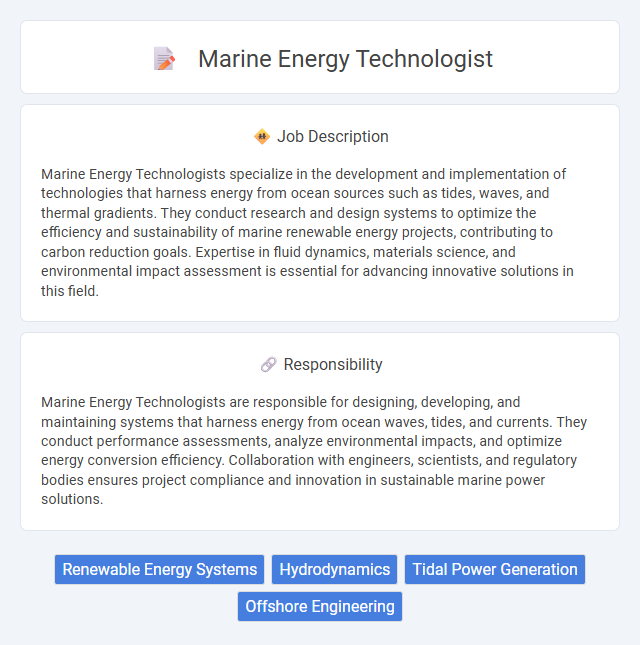
Marine Energy Technologists specialize in the development and implementation of technologies that harness energy from ocean sources such as tides, waves, and thermal gradients. They conduct research and design systems to optimize the efficiency and sustainability of marine renewable energy projects, contributing to carbon reduction goals. Expertise in fluid dynamics, materials science, and environmental impact assessment is essential for advancing innovative solutions in this field.
Individuals with strong analytical skills and a passion for renewable energy are likely to find marine energy technologist roles suitable. Those comfortable working in dynamic, outdoor environments and collaborating with multidisciplinary teams may experience higher job satisfaction. It is probable that candidates with a background in engineering, marine science, or environmental technology will adapt well to the technical and physical demands of this profession.
Qualification
A Marine Energy Technologist typically holds a degree in marine engineering, renewable energy, or environmental science, accompanied by specialized training in ocean energy systems such as tidal, wave, and offshore wind technologies. Proficiency in computer modeling, data analysis, and project management is essential, alongside knowledge of marine ecosystems and regulatory compliance standards. Hands-on experience with installation, maintenance, and optimization of marine energy devices enhances a candidate's qualifications for advancing sustainable energy solutions.
Responsibility
Marine Energy Technologists are responsible for designing, developing, and maintaining systems that harness energy from ocean waves, tides, and currents. They conduct performance assessments, analyze environmental impacts, and optimize energy conversion efficiency. Collaboration with engineers, scientists, and regulatory bodies ensures project compliance and innovation in sustainable marine power solutions.
Benefit
Marine energy technologists likely experience significant benefits such as contributing to sustainable energy solutions and reducing carbon emissions. There is a strong probability of gaining expertise in cutting-edge renewable energy technologies and innovations in wave, tidal, and offshore wind energy. This role may offer opportunities for career advancement and involvement in groundbreaking projects within the green energy sector.
Challenge
Marine Energy Technologist roles likely involve navigating complex engineering challenges related to harnessing renewable ocean energy sources efficiently. There is a high probability of encountering technical difficulties in optimizing devices to withstand harsh marine environments while maximizing energy output. Problem-solving skills are probably essential as they address unpredictable environmental variables and work to innovate sustainable, cost-effective solutions.
Career Advancement
A Marine Energy Technologist advances by developing expertise in wave, tidal, and offshore wind energy systems, driving innovation in renewable marine power generation. Career progression often includes roles in project management, research and development, and policy advising within the blue energy sector. Mastery of cutting-edge technologies and regulatory frameworks enhances opportunities for leadership positions in sustainable marine energy projects.
Key Terms
Renewable Energy Systems
Marine Energy Technologists specialize in designing and implementing renewable energy systems that harness ocean resources such as tidal, wave, and offshore wind power. Their expertise includes optimizing energy extraction technologies, conducting environmental impact assessments, and integrating marine energy solutions into existing grids. Mastery of engineering principles and familiarity with sustainable energy regulations are essential for advancing marine-based renewable power generation.
Hydrodynamics
Marine Energy Technologists specializing in hydrodynamics analyze fluid flow and wave interactions to optimize energy extraction from ocean currents, tides, and waves. They employ computational fluid dynamics (CFD) models and physical testing to enhance the efficiency and durability of marine energy devices such as tidal turbines and wave energy converters. Expertise in hydrodynamic simulation and environmental impact assessment is critical for developing sustainable marine renewable energy solutions.
Tidal Power Generation
Marine Energy Technologists specializing in tidal power generation design and develop advanced turbines and infrastructure to harness energy from ocean tides efficiently. They analyze tidal patterns and environmental impacts to optimize energy output while ensuring sustainability and minimal ecological disruption. Expertise in hydraulics, marine engineering, and renewable energy systems is essential for implementing robust tidal power solutions in coastal regions.
Offshore Engineering
Marine Energy Technologists specializing in Offshore Engineering design and implement renewable energy systems such as tidal turbines and offshore wind farms to maximize energy extraction from marine environments. They conduct structural analysis, perform site assessments, and ensure compliance with environmental regulations to optimize the durability and efficiency of offshore energy installations. Expertise in fluid dynamics, materials science, and subsea systems is essential for overcoming challenges posed by harsh marine conditions.
 kuljobs.com
kuljobs.com